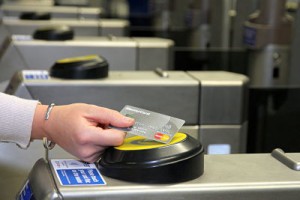
Sydney will follow London’s lead and let commuters use their everyday ‘tap-and-go’ credit and debit cards at public transport ticket barriers instead of using the popular Opal Card, a move that will provide bonanza for banks and could save the government millions.
The radical push to remove the need for proprietary tickets, first revealed by Government News in November 2015, was publicly confirmed in Sydney by New South Wales transport Minister Andrew Constance at the Future Transport Summit on Monday and kicks off in 2017.
Although officially still billed as a trial, the flip to use bank-issued contactless smartcards – or smartphones that have NFC (near field communications) chips built into them to them – is likely to revolutionise easy access to public transport in Sydney if London’s experience is anything to go by.
If successful, it will also place substantial pressure on other states to bring their public transit ticketing systems into line as the ticket-free experience spreads across intercity domestic travellers and international tourists.
“Only a few major mass transit systems, similar in scale to Sydney’s have introduced contactless payments,” Mr Constance said. “London’s Oyster card system is a well-known example, where they only finalised their rollout in late 2014.”
Sydney’s Opal system is of course largely cloned from London’s Oyster card, right down to close input from Transport for London which uses largely the same ticket reader equipment from Cubic Transportation Systems has systems of varying age also embedded in New York (MetroCard), Los Angeles and Chicago as well as other cities.
In Australia, Cubic also underpins the Brisbane Go Card system and the company also has its sights set on the upgrade of Melbourne’s Myki ticket that is now in the market.
Fortuitously, Transport for London’s Director of Customer Experience and de-ticketing guru Shashi Verma was on-hand to share London’s lessons with Sydney and Australia yesterday, frankly telling Future Transport Summit that his organisation had needed to educate banks about the opportunities for them around transport ticketing.
Asked what kind of fees the banks were likely to reap from transit from a switch to cards they issued, Mr Verma said banks would collect fees on transactions irrespective of whether operators issued tickets or not.
What changed by enabling everyday payment cards to work direct at the ticket gate was that the transit operators no longer had to make special transport money just to work on their system.
While those savings had been around £100 million, enabling mainstream contactless payment had also pushed-up fare revenue Mr Verma said. Put simply, the easier it is for people to pay, the more paid.
Card schemes, which have been using the example of Transport for London to showcase how their products can be innovated for public good were, naturally, ecstatic that Sydney is following London.
“MasterCard is extremely excited that the NSW Government has announced they will begin a customer trial of debit and credit card contactless payments for travelling on public transport,” the company said in a statement.
“London in particular has paved the way for contactless payment use in transit. Contactless debit and credit card payments were trialled and launched on London Buses in December 2012 and expanded across the city’s network in 2014. To date, more than 350 million rides have been made using contactless technology with over one million journeys made each day.
“At MasterCard we see efficient urban mobility, how people get around cities in a simple and seamless way, as key to enabling citizens and visitors to go about their lives with ease, and enabling businesses to innovate and grow. Sydney, a business and tourist hotspot is the perfect city to lead the charge for transit contactless technology in Australia. This will also make Sydney more appealing to international visitors and help boost local tourism.”
And while there’s no interest like self-interest, they have a point.
As anyone who has used London’s system will tell you, there is more than a little comfort in knowing that you won’t be stuck in a queue trying to top-up or leaving money behind on a card when you go.
Comment below to have your say on this story.
If you have a news story or tip-off, get in touch at editorial@governmentnews.com.au.
Sign up to the Government News newsletter
Most read
Scathing report finds little has changed at PwC
Qld council welcomes progress on massive battery system
Inquiry to consider how federal govt can address councils’ sustainability issues
‘Local’ procurement turns out not to be so local, committee hears
Another report finds local government falling down on cyber security

